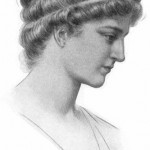“Life is an unfoldment, and the further we travel, the more truth we comprehend. To understand the things that are at our door is the best preparation for understanding those that lie beyond.” Hypatia
I hope that you may find joy as I did in knowing that such a woman walked this earth.
Hypatia a mathematician and astronomer was born about 355 A.D daughter of Theon of Alexandria. Theon wanting his daughter to be the best she could be, he made sure to educate her in all of these subjects…as well as developing a physical routine to ensure for her a healthy body. A brilliant young woman, Hypatia surpassed her father’s knowledge.
Hepatia became a teacher at Alexandria’s Neoplatonic School; later she became its director…a remarkable accomplishment for a woman in those days. Her lectures were lively and interesting, and she was loved and admired by all and well respected by many of the officials. Many prominent Christians were among her pupils, including Synesuis, who was later to become the Bishop of Ptolemais
Profoundly liberated for her time, she refused to marry and drove her own chariots through the streets of the city. The invention of the astrolabe is accredited to her.
But, Hypatia lived at a time when there was conflict between the Pagans on one side and Christians on the other, who were demanding an end to paganism. Hypatia symbolized learning and science which those early Christians identified with paganism. With the death of Synesuis she was left vulnerable to those who sought to get rid of her.
Cyril, the Archbishop of Alexandria, considered Hypatia to be a symbol of the learning and science which he considered to be pagan. “In the year 415, on her way to work she was set upon by a fanatical mob of Cyril’s parishioners. They dragged her from her chariot, tore off her clothes, and, armed with shells, flayed her flesh from her bones. Her remains were burned, her works obliterated. Cyril was made a saint”
Hypatia lives on forever, though, sitting serenely on the Moon, her crater located near the crater that was named for her father. Her reputation has inspired the imaginations of many writers.
Daisy Says: In the words of Hypatia
“Reserve your right to think, for even to think wrongly is better than to not think at all.”–Hypatia

